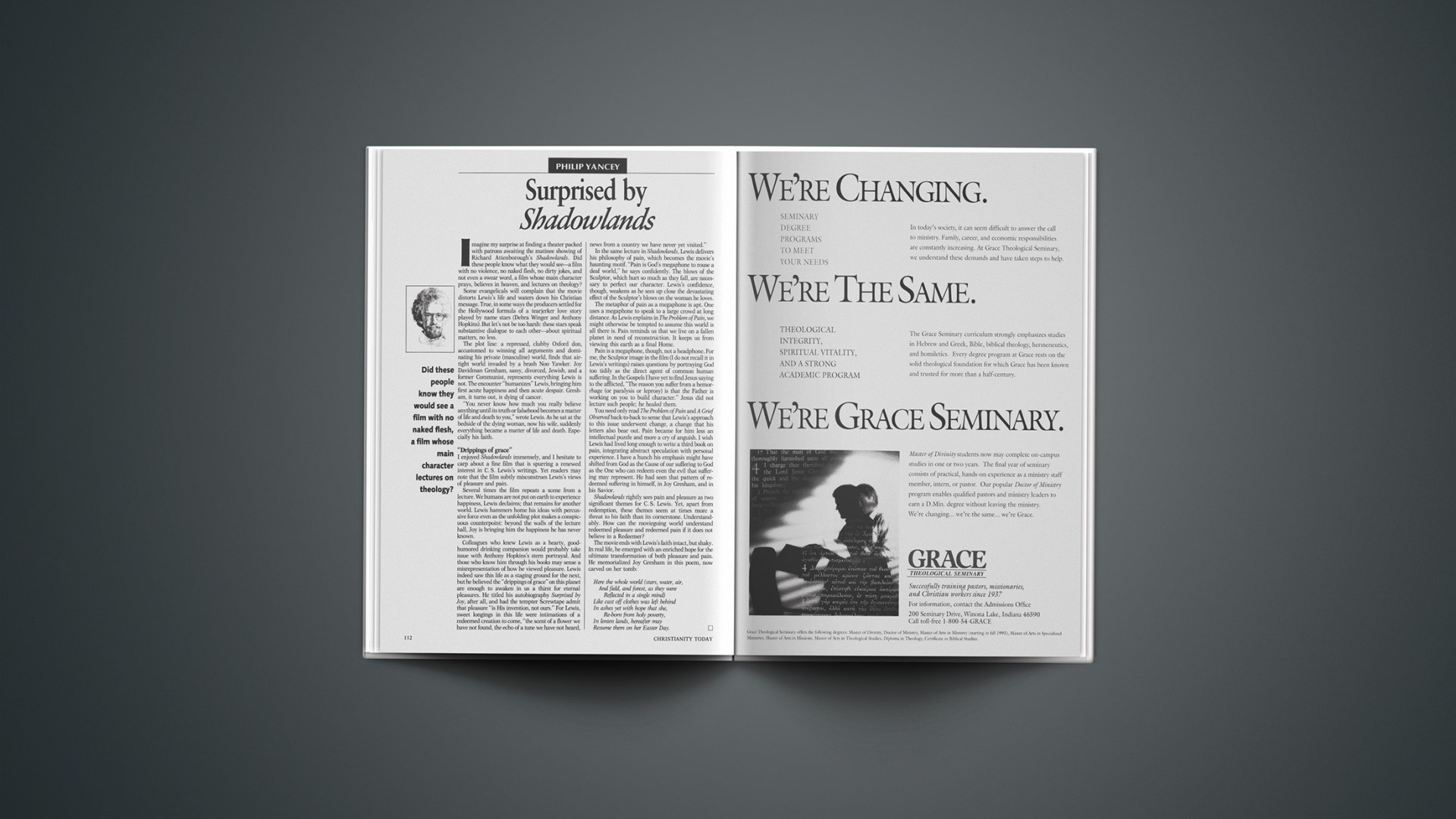Imagine my surprise at finding a theater packed with patrons awaiting the matinee showing of Richard Attenborough’s Shadowlands. Did these people know what they would see—a film with no violence, no naked flesh, no dirty jokes, and not even a swear word, a film whose main character prays, believes in heaven, and lectures on theology?
Some evangelicals will complain that the movie distorts Lewis’s life and waters down his Christian message. True, in some ways the producers settled for the Hollywood formula of a tearjerker love story played by name stars (Debra Winger and Anthony Hopkins). But let’s not be too harsh: these stars speak substantive dialogue to each other—about spiritual matters, no less.
The plot line: a repressed, clubby Oxford don, accustomed to winning all arguments and dominating his private (masculine) world, finds that airtight world invaded by a brash Noo Yawker. Joy Davidman Gresham, sassy, divorced, Jewish, and a former Communist, represents everything Lewis is not. The encounter “humanizes” Lewis, bringing him first acute happiness and then acute despair. Gresham, it turns out, is dying of cancer.
“You never know how much you really believe anything until its truth or falsehood becomes a matter of life and death to you,” wrote Lewis. As he sat at the bedside of the dying woman, now his wife, suddenly everything became a matter of life and death. Especially his faith.
“Drippings of grace”
I enjoyed Shadowlands immensely, and I hesitate to carp about a fine film that is spurring a renewed interest in C. S. Lewis’s writings. Yet readers may note that the film subtly misconstrues Lewis’s views of pleasure and pain.
Several times the film repeats a scene from a lecture. We humans are not put on earth to experience happiness, Lewis declaims; that remains for another world. Lewis hammers home his ideas with percussive force even as the unfolding plot makes a conspicuous counterpoint: beyond the walls of the lecture hall, Joy is bringing him the happiness he has never known.
Colleagues who knew Lewis as a hearty, good-humored drinking companion would probably take issue with Anthony Hopkins’s stem portrayal. And those who know him through his books may sense a misrepresentation of how he viewed pleasure. Lewis indeed saw this life as a staging ground for the next, but he believed the “drippings of grace” on this planet Eire enough to awaken in us a thirst for eternal pleasures. He titled his autobiography Surprised by Joy, after all, and had the tempter Screwtape admit that pleasure “is His invention, not ours.” For Lewis, sweet longings in this life were intimations of a redeemed creation to come, “the scent of a flower we have not found, the echo of a tune we have not heard, news from a country we have never yet visited.”
In the same lecture in Shadowlands, Lewis delivers his philosophy of pain, which becomes the movie’s haunting motif. “Pain is God’s megaphone to rouse a deaf world,” he says confidently. The blows of the Sculptor, which hurt so much as they fall, are necessary to perfect our character. Lewis’s confidence, though, weakens as he sees up close the devastating effect of the Sculptor’s blows on the woman he loves.
The metaphor of pain as a megaphone is apt. One uses a megaphone to speak to a large crowd at long distance. As Lewis explains in The Problem of Pain, we might otherwise be tempted to assume this world is all there is. Pain reminds us that we live on a fallen planet in need of reconstruction. It keeps us from viewing this earth as a final Home.
Pain is a megaphone, though, not a headphone. For me, the Sculptor image in the film (I do not recall it in Lewis’s writings) raises questions by portraying God too tidily as the direct agent of common human suffering. In the Gospels I have yet to find Jesus saying to the afflicted, “The reason you suffer from a hemorrhage (or paralysis or leprosy) is that the Father is working on you to build character.” Jesus did not lecture such people; he healed them.
You need only read The Problem of Pain and A Grief Observed back-to-back to sense that Lewis’s approach to this issue underwent change, a change that his letters also bear out. Pain became for him less an intellectual puzzle and more a cry of anguish. I wish Lewis had lived long enough to write a third book on pain, integrating abstract speculation with personal experience. I have a hunch his emphasis might have shifted from God as the Cause of our suffering to God as the One who can redeem even the evil that suffering may represent. He had seen that pattern of redeemed suffering in himself, in Joy Gresham, and in his Savior.
Shadowlands rightly sees pain and pleasure as two significant themes for C. S. Lewis. Yet, apart from redemption, these themes seem at times more a threat to his faith than its cornerstone. Understandably. How can the moviegoing world understand redeemed pleasure and redeemed pain if it does not believe in a Redeemer?
The movie ends with Lewis’s faith intact, but shaky. In real life, he emerged with an enriched hope for the ultimate transformation of both pleasure and pain. He memorialized Joy Gresham in this poem, now carved on her tomb:
Here the whole world (stars, water, air,
And field, and forest, as they were
Reflected in a single mind)
Like cast off clothes was left behind
In ashes yet with hope that she,
Re-born from holy poverty,
In lenten lands, hereafter may
Resume them on her Easter Day.










